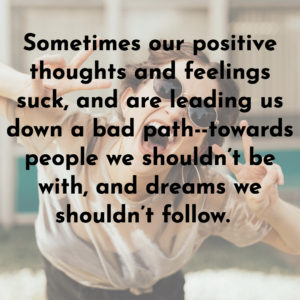If you’ve ever wondered why PBS exists (weird thing for you to wonder, but roll with it), one could argue it’s because Mr. Rogers went before congress in 1969 and pleaded for funding by trying to demonstrate the value of educational programming for kids. In that plea, he exemplified that value by reciting the following song featured on his show.
What do you do with the mad that you feel
When you feel so mad you could bite?
When the whole wide world seems oh, so wrong…
And nothing you do seems very right?
What do you do? Do you punch a bag?
Do you pound some clay or some dough?
Do you round up friends for a game of tag?
Or see how fast you go?
It’s great to be able to stop
When you’ve planned a thing that’s wrong,
And be able to do something else instead
And think this song:
I can stop when I want to
Can stop when I wish
I can stop, stop, stop any time.
And what a good feeling to feel like this
And know that the feeling is really mine.
Know that there’s something deep inside
That helps us become what we can.
For a girl can be someday a lady,
And a boy can be someday a man.
(Link to the exact timecode of the reading)
At the risk of being slightly crass, that guy was the fucking tits.
The weird part of that is we read it, and think, “Oh what a great lesson for children,” when in reality, most adults suuuuuuuuck at this. We are absolute garbage at processing negative thoughts and feelings.
We lose a lot of lessons from childhood. These lessons become gruff, and counterintuitively, way more oversimplified as we enter adulthood. A song like this, or a narrative TV episode that goes into great detail about how to be kind to each other gets replaced in adulthood with the notion of, “Don’t be an asshole, Paul.”
And don’t get me wrong: “Don’t be an asshole, Paul,” remains super relevant. It’s a great idea.
What doesn’t get brought up is the question of, “What if I really feel like being an asshole?”
The answer remains to not be one, of course, but that doesn’t address what you do with the feeling, the urge, the anger that’s spawning your asshole-ish impulses.
More broadly, what do we do with negative thoughts, and feelings? How do we react when we observe our own angry actions, antagonistic thoughts, and depressive feelings?
Do we just grin and bear the anger, and push it down? Do we accept it as a mysterious inevitability, wait for it to come around, and then grin and bear it again?
I feel like that’s what most of us do. But can we do something else? Something more productive? What can we learn from this?
Let’s break this all down.
Negative Thoughts: Flaw-Finders
Some will tell you to expel the negative thoughts from your life–that all negativity is evil, and destructive, and that you are a perfect superstar just the way you are.
But, of course, you totally aren’t.
But don’t worry. Ironing out imperfections means you can live a better life tomorrow. It means there are great things you can experience for the first time because you’re just now not-fucked-up enough to really experience them. It means you get to learn, which is like, kind of the reason you’re here.
But negative thoughts only produce all of those positive results if, 1) You give yourself a chance to think them, and 2) If you take the time to learn from them.
How to Respond to Negative Thoughts
So when you have negative thoughts–be them about yourself, your co-workers, your weird uncle, the state of everything in the world–whatever, stop for a second. Ask yourself where this is really coming from. Ask yourself why you’re judging people instead of seeking to understand them.
Ask yourself why you’re calling yourself an asshole–like it’s an inevitability–rather than a temporary state.
Ask yourself why you’re so sure your plans won’t work out–as if you have any fucking clue what will or won’t work out.

Every negative thought is a learning opportunity. It’s a clue as to what is really going on. You can either step back and examine it, and verify it’s accuracy, or you can continue on with your dumb life, thinking the same thoughts, making no progress, and remain painfully self-unaware.
Letting your bad thoughts go unchecked sucks because when you don’t examine your thoughts, you automatically validate them–even the really, really fucking stupid, destructive thoughts.
All thoughts are a window into your subconscious, and correcting negative ones that are wrong or damaging is an opportunity to push back against the demons that live deep inside of your skull. It’s an opportunity to stop the festering, and start moving your entire being into a new direction.
Or, if your negative thoughts are totally justified and legitimate, it’s an opportunity to ask what you can change. Maybe all evidence so far does indicate that you’re an asshole. Cool. Glad that’s figured out. Now you can look to change that.

For negative feelings, let’s revisit Mr. Rogers:
What Do We Do With The Mad That We Feel?
Negative feelings, like negative thoughts, are a clue as to what’s really going on with you, and how you can fix it.
But as with negative thoughts, you can only know what negative feelings mean if you fully let them exist, listen to them, and question them.
This is good for the Mr. Rogers reason–it helps you often see that your anger isn’t helping, and allows you the pride of getting control of yourself and your behavior. That’s wonderful, but there are other reasons it helps as well.
If your bad feelings are justified, examining them helps you see what you can do about it. If you examine why–really why–someone is pissing you off, only then can you rationally think about what to do about it that’s more productive than calling them a fucking asshole (though to be fair, sometimes that’s the only course).
Feeling anger and sadness is also great because there is some degree of yin and yang to life. If you drown out every negative feeling by drool-scrolling on your phone, you won’t be able to fully appreciate the positive feelings in life.

It’s only after we’ve been through a shitstorm that we’re able to just appreciate a nice, sunny day. It’s only when we’ve been crying that we can truly appreciate laughter to its fullest extent. The full, real existence of the bad is what highlights the good, and that highlighted, legitimately good feeling is kind of the best part of being on this planet.
“I Was Just an Asshole. What Does That Mean?”
Similarly, we can learn from our negative actions in the same way we can learn from negative thoughts and feelings. Every time you overreact, lash out, insult someone, do something selfish or fuck up in any number of other ways, you’ve got a big time learning opportunity if you choose to take it.
I’m not saying you should aggressively look to fuck up your life all the time in the pursuit of knowledge. But when you do, take the positive from it. Look forward to the fact that you can learn how to never let that happen again. Figure out not just how to not act out, but why you felt the urge to act out in the first place.
Also: Listen to the Positivity
It’s important to listen to, examine, and validate our positive feelings and thoughts too.
Sometimes our positive thoughts and feelings suck, and are leading us down a bad path–towards people we shouldn’t be with, and dreams we shouldn’t follow.

It’s important when you’re falling into what you think is love with an asshole, that you’re able to stop, stop, stop, and step back, and ask yourself if what you’re feeling is legitimate, if it’s healthy, and if it’s truly beneficial.
It’s important when you’re using positive thinking to convince yourself that a terrible idea is actually good, that you’re able to step back from this positive thinking, and all of the rosy feelings it causes, and to question its validity.
Perhaps more than anything though, it’s important to validate your positivity, because when it’s legitimate, and you’re positively, productively happy, you should squeeze every damn ounce out of that when you can. When you’re justifiably happy, simply feeling it for a moment is selling yourself short. Bask in that legitimate joy. Savor it, appreciate it, and celebrate it.
Do whatever you can to reflect on your thoughts and feelings. Journal, meditate, talk out what’s going on with others. Even just fucking stop for a second and reconsider what just happened. Get to the bottom of your feelings. Listen to the clues. Follow your trails of tears, and laughter, and screaming at traffic, and learn more about who you really are, and what you’re really doing, and how all of that can suck less in the future.
Always remember you can stop when you want to, you can stop when you wish, and you can decide to be more like Mr. Rogers, and less like that person you, starting now, used to be.






